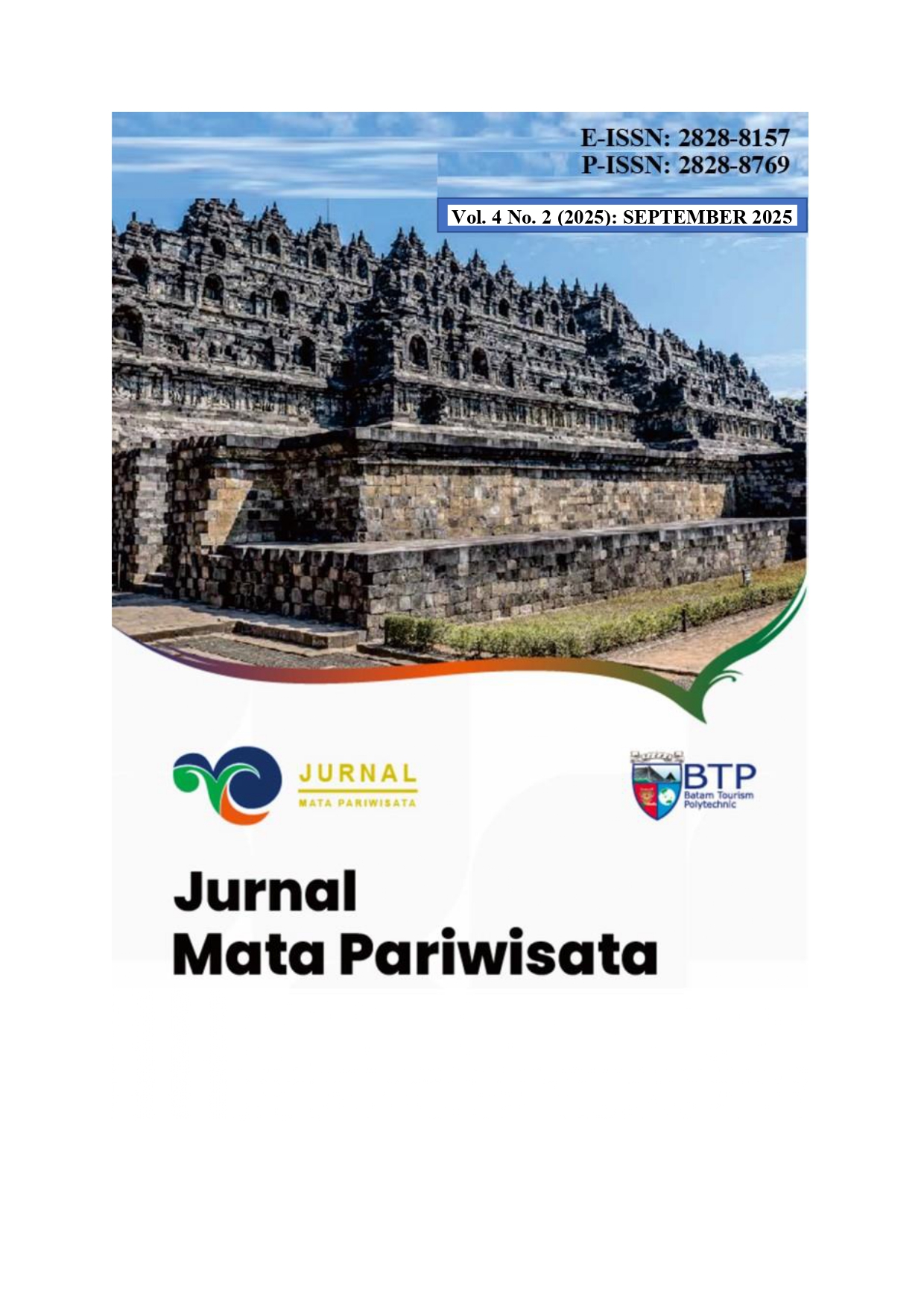ANALISIS POTENSI DESTINASI WISATA PASAR MODERN SUMMARECON BANDUNG SEBAGAI PARIWISATA RAMAH MUSLIM (PRM)
DOI:
https://doi.org/10.59193/jmp.v4i2.439Keywords:
Halal tourism, Summarecon Modern Market, accessibility, communication, environment, serviceAbstract
Halal tourism is a rapidly growing sector globally, with Muslim tourist trips projected to reach 230 million by 2028, according to the 2023 Global Muslim Travel Index (GMTI). Indonesia, as a predominantly Muslim country, has significant potential to develop halal-compliant tourist destinations, including West Java, which boasts rich tourism potential. One such destination is the Summarecon Modern Market, renowned for its beauty and uniqueness. This study aims to analyse the potential of the Summarecon Modern Market as a halal tourism destination based on four GMTI indicators: accessibility, communication, environment, and services. The research method used was a descriptive qualitative case study approach, where data were collected through in-depth interviews with managers, tourists, and vendors, as well as direct on-site observation. The results indicate that the Summarecon Modern Market excels in accessibility with easy transportation and ample parking facilities, a clean environment, and friendly and responsive service. However, there are still shortcomings in the communication of halal information, which has not been communicated strategically, and the low number of vendors with halal certification. Based on these findings, strengthening halal literacy among business actors, improving public information regarding halal facilities, and implementing halal certification assistance programs are needed to enhance the competitiveness of Summarecon Modern Market in the national and global halal tourism markets.
Downloads
References
Armiani, A., Basuki, B., & Nurrahmadani, S. (2021). Sertifikat Halal Menjadi Strategi Pemasaran Bagi Umkm Nonmuslim dalam Meningkatkan Penjualan. Prosiding Seminar Stiami, 8(1), 481. https://ojs.stiami.ac.id/index.php/PS/article/view/1363
Battour, M., & Ismail, M. N. (2016). Halal tourism: Concepts, practises, challenges and future. Tourism Management Perspectives, 19(3), 150–154. https://doi.org/10.1016/j.tmp.2015.12.008
Destiani, J. A., & Ramdani, D. (2025). Analisis Atraksi Wisata Dan Dampak Kebijakan Terhadap Masyarakat Sekitar Di Museum Konperensi Asia Afrika Bandung. JUKONI: Jurnal Ilmu Ekonomi Dan Bisnis, 2(5), 115–120. https://sihojurnal.com/index.php/jukoni/article/view/628
Eid, R., & El-Gohary, H. (2015). Muslim Tourist Perceived Value in the Hospitality and Tourism Industry. Journal of Travel Research, 54(6), 774–787. https://doi.org/10.1177/0047287514532367
GMII. (2024). BRIDGING JOURNEYS Spotlight on RIDA Framework and Accessible Travel in GMTI 2024. Ukinbound.Org. https://www.ukinbound.org/wp-content/uploads/2024/06/Global-Muslim-Travel-Index.pdf
Hardani, Auliya, N. H., Andriani Helmina, Fardani, R. A., Ustiawaty, J., Utami, E. F., Sukmana, D. J., & Istiqomah, R. R. (2020). Buku Metode Penelitian Kualitatif & Kuantitatif. Pustaka Ilmu Group.
Hilmi Tsania, N., Ikbal, M., Sumartini, S., Zharfa, D. A., & Noor, A. A. (2023). Analisis Penerapan Konsep Wisata Halal di Destinasi Wisata, Studi: Farmhouse Susu Lembang. Tourism Scientific Journal, 9(1), 64–75. https://doi.org/10.32659/tsj.v9i1.304
Iba, Z., & Wardhana, A. (2023). Metode Penelitian (1st ed.). CV. Eureka Media Aksara.
Marlina, L., & Hidayati, N. (2023). Peran Pariwisata Berbasis Industri dalam Pengembangan Bisnis di Indonesia. Jurnal Riset Multidisiplin Dan Inovasi Teknologi, 1(01), 31–40. https://doi.org/10.59653/jimat.v1i01.163
Mastercard Crescentrating. (2024). BRIDGING JOURNEYS Spotlight on RIDA Framework and Accessible Travel in GMTI 2024. Mastercard Crescentrating.
Matthew B Miles, A Michael Huberman, J. S. (2020). Qualitative Data Analysis (A Methods Sourcebook) (Helen Salmon (ed.)). SAGE Publications.
Mujtahid, M., Assidiqi, A. H., & Sadiyah, D. (2025). The Concept of Religious Moderation From Sunan Kudus’ Perspective and Its Correlation with Islamic Education in The Modern Era. Al Ulya: Jurnal Pendidikan Islam, 10(1), 103–120. https://doi.org/10.32665/alulya.v10i1.3232
Nahdiyati, A., & Yusdalifa, S. (2020). Integrasi Pendidikan Islam Dalam Pengembangan Pariwisata Halal Di Indonesia. As-Sulthan Journal Of Education, 3(2), 1. https://ojssulthan.com/asje/article/view/82
Noer Afifah, A., Bintang, M., & Daffa, A. Al. (2023). Daya Tarik Wisata Taman Hutan Raya Ir.H Djuanda Sebagai Tempat Wisata Dan Tempat Tracking Yang Mempunyai Sejarah Bagi Wisata. Pragmatik : Jurnal Rumpun Ilmu Bahasa Dan Pendidikan, 1(3), 10–18. https://doi.org/10.61132/pragmatik.v1i3.203
Parhan, M., Islamy, M. R. F., Budiyanti, N., Nugraha, R. H., Subakti, G. E., & Fuaddin, A. (2020). The opportunities and challenges halal tourism in Bandung-Indonesia Regency. Jurnal IPTA (Industri Perjalanan Wisata), 9(1), 2338–8633.
Pratiwi, A. E. (2021). Analisis Pasar Wisata Syariah di Kota Yogyakarta. Media Wisata, 14(1). https://doi.org/10.36276/mws.v14i1.246
Ramadhan, A. A., Huda, M. M., & Suhindarno, H. (2025). Tata Kelola Pariwisata Berbasis Ecotourism (Studi Kasus Di Taman Wisata Goa Ngerong Kecamatan Rengel). Jurnal Ilmiah Dinamika Sosial, 9(1), 1–16. https://doi.org/10.38043/jids.v9i1.5971
Riansyah, A., & Ismail., N. (2024). Pengaruh Tingkat Literasi Wisata Halal, dan Perilaku Wisatawan Terhadap Minat Berwisata Halal di Provinsi Riau. Indonesian Journal of Islamic Economics and Business, 9(1), 110. https://ojp.lp2m.uinjambi.ac.id/index.php/ijoieb/article/view/2284
Sana, I. N. L. (2025). Strategi Pengelolaan Pariwisata Berkelanjutan untuk Mengurangi Dampak Lingkungan di Destinasi Wisata Alam Indonesia. Mandalika Journal of Business and Management Studies, 3(1), 24–36. https://doi.org/10.59613/mjbms.v3i1.205
Sari, N. Y., Sapa Ardesta, P., & Hak, N. (2024). Pengembangan Wisata Halal Dengan Analisis SWOT Dalam Meningkatkan Pertumbuhan Ekonomi Di Daerah Bengkulu. MESTAKA: Jurnal Pengabdian Kepada Masyarakat, 3(6), 634–638. https://doi.org/10.58184/mestaka.v3i6.509
Setiawati, S., & Ramdani, D. (2025). Analisis Dampak Kebijakan Pariwisata Berkelanjutan Terhadap Kunjungan Wisatawan Dan Ekonomi Masyarakat Di Kadaka Hills Tanjungsari. JUKONI: Jurnal Ilmu Ekonomi Dan Bisnis, 2(2), 109–114. https://sihojurnal.com/index.php/jukoni/article/view/627
Setyowardhani, H., Susanti, H., & Riyanto. (2019). Optimalisasi Media Sosial sebagai Alat Promosi untuk Desa Wisata Lebakmuncang. Dinamisia : Jurnal Pengabdian Kepada Masyarakat, 3. https://doi.org/10.31849/dinamisia.v3i2.2848
Sugiyono. (2019). Metode Penelitian Kuantitatif, Kualitatif, dan RND. Alfabeta.
Wahyulina, S., Darwini, S., Retnowati, W., & Oktaryani, S. (2018). Persepsi Wisatawan Muslim Terhadap Sarana Penunjang Wisata Halal Dikawasan Desa Sembalun Lawang Lombok Timur. JMM UNRAM - MASTER OF MANAGEMENT JOURNAL, 7(1), 32–42. https://doi.org/10.29303/jmm.v7i1.400
Waruwu, M. (2023). Pendekatan Penelitian Pendidikan: Metode Penelitian Kualitatif, Metode Penelitian Kuantitatif dan Metode Penelitian Kombinasi (Mixed Method). Jurnal Pendidikan Tambusai, 7(1), 2896–2910.

Downloads
Published
How to Cite
Issue
Section
License
Copyright (c) 2025 Dadan Ramdani

This work is licensed under a Creative Commons Attribution 4.0 International License.














